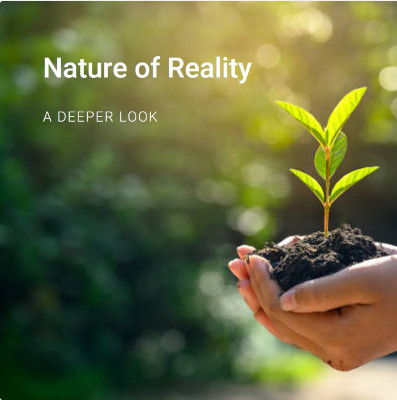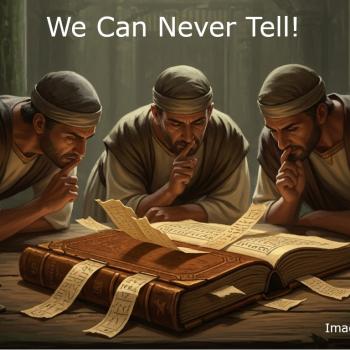The Big Questions series
(You can also watch What Is Reality? as a videocast on Youtube.)
For this topic a little levity is required:
“Reality is merely an illusion, albeit a very persistent one.” “Look deep into nature, and then you will understand everything better.” ― Albert Einstein quoted on Goodreads and Brainy Quotes.
“Do not take life too seriously. You never get out of it alive.” ― Elbert Hubbard quoted on ourmindfullife.com
“Initially, it sounds as if Philo is claiming that we cannot really believe anything. Cleanthes asks, then, whether he will leave by the door or by the window when they finish their discussion: that is, is he skeptical enough about the laws of gravity that he will leap several stories?”
– Philosopher David Hume
Yeah, maybe not.
There are five or more forms of reality that I can identify, which many may want to dispute: Those are physical, social, authentic, perceived, and our reality.

Physical reality
Physical reality is simple. You can beat your head against it and it doesn’t change anything but makes your head sore. It may be that some can change their vibrations and be in a different reality. It may be that some can take a vacation in their heads and be elsewhere. But miracles aside, both get injured if a rock falls on them regardless of where they think they are.
We change physical reality through our physical actions, but only in accord with the laws of the universe.
Social reality
Social reality is the world created by ourselves and others. It gives us meaning, laws, inspires purpose and pursuits, and presents us with arenas in which to pursue these things.
Religion is often a strong part of social reality. Religion describes beliefs and practices that are thought to bring us to our best life. It often exerts peer pressure on us to conform. Yet people find that religion can also be a very divisive and destructive influence. It’s up to us to decide if religion’s precepts conform to the love of God. No other person is ultimately responsible for our lives and behavior.
We are not alone in this world. We depend on others and they depend on us, and our society creates the rules and helps create the opportunities.
We can ignore social reality but if we go without clothes made by others we will freeze to death. Okay, you won’t freeze to death at the equator but the authorities throw naked offenders in jail. That’s a harsh reality to live with.
Authentic reality
What is what I call authentic? Authentic means genuine and undisputed. It means that the products we see around us aren’t fake or imitation and that people around us act true to their nature.
There is no 100% authentic thing on this planet. Manufacturers change recipes or lists of materials or manufacturing methods that alter products. People are honest unless they’re telling white lies to avoid insulting people or being forced to lie. Everyone has their breaking point – we’re humans not machines.
The only thing we can expect as authentic are things we can count on. I believe this is what Jesus meant when he said, “This is very true.” We can count on these things.
We have to avoid myths that are not true. For example the idea that if we all work very hard at our jobs we will earn a decent living is upended when people work very hard at low paying jobs and encounter financial tragedy after tragedy from cars breaking down to losing their homes. Our economy isn’t there for individuals.
It’s up to us to assess what is really authentic in our world. To do that we may have to get a lot of input from others who know. And then we have to live with our choices.
Perceived reality
We all perceive reality in different ways, but we’re usually close enough. There is no 100% because we don’t all have the same experiences to judge by.
Perceived reality is the most slippery and dangerous of all. Our perceptions may make things seem real that aren’t necessarily so. I talk about this in a long series on my Our Times Today and Tomorrow podcast.
For example, we may perceive that someone is angry with us and stop interacting with them. But they may not be angry at all. So through misperception we lose that person as a friend who may have been very helpful to us in our lives.
Perceived reality can result in neurotic thinking which can lead to adverse outcomes. It can make others think we are irrational or insane and avoid us. The most effective defense against misperceptions is to test what we think is true to find out if it really is.
You might want to talk to that angry friend and try to resolve any differences you may have. It will create an even better relationship. A friend for life is better than 9000 on social media.
Our personal reality
Our own reality is constrained by both the physical and social worlds, and this interaction is generally where we find meaning, purpose, and opportunity.
We also have the capacity to have our own world in which we have things that are meaningful to us. We have our purpose, and we strive to achieve it. Others don’t have to understand nor can they even see our reality.
What does this mean to us?
We all live in a very real physical world that doesn’t change regardless of how strongly we wish to change it. I’ve yet to see anyone float off the ground or live at the bottom of the sea. Physical reality is changed only by our and others’ physical actions and those are limited to the laws of the universe.
The social world is the place where we find meaning and purpose and have opportunities to achieve them. It creates laws and rules that prevent us from harming others and them from harming us.
Genuine reality is something we can count on, but not 100%. The world constantly changes and we have to adapt.
The world of perceptions is where we all live, but we have to avoid misperception or we could end up in real trouble.
We can have our own way of life as long or reality as it doesn’t violate the physical and social worlds’ restrictions.
Note that my research for this article-post utilized Google Bard for comparison, but it was written by me from my point of view. Bard performed very well and the results are shown below.
You might also enjoy my podcast, Our Times today and tomorrow and article series on Substack, which delves more deeply into a wide variety of topics with a spirituality focus.
From Google Bard, for comparison
Reality is a complex and multifaceted concept that has been debated by philosophers and scientists for centuries. There is no single definition of reality that is universally agreed upon, but it is generally understood to refer to the world as it exists independently of our minds.
There are many different ways to think about reality. Some people believe that reality is objective, meaning that it exists independently of our perceptions. Others believe that reality is subjective, meaning that it is created by our minds. Still others believe that reality is a combination of both objective and subjective elements.
The nature of reality is a difficult question to answer, and there is no one right answer. However, it is an important question to consider, as it can help us to better understand ourselves and the world around us.
Here are some additional thoughts on the nature of reality:
- Reality is constantly changing. What we perceive as reality today may not be the same as what we perceive as reality tomorrow.
- Reality is not always what it seems. Our perceptions can be influenced by our biases, expectations, and experiences.
- Reality is not always easy to accept. Sometimes, reality can be harsh, unfair, or even painful.
- Despite its challenges, reality is also a source of beauty, wonder, and joy.
Ultimately, the nature of reality is a mystery. However, by exploring this mystery, we can gain a deeper understanding of ourselves and the world around us.
________________________
The standard of belief and conduct for Christianity is love. God is love. We’re asked to be like God.
________________________
If you find these articles intriguing, please consider joining the mailing list.
If I’ve challenged your thinking, I’ve done my job.
___________________
Our answer is God. God’s answer is us. Together we make the world better.
– Dorian












